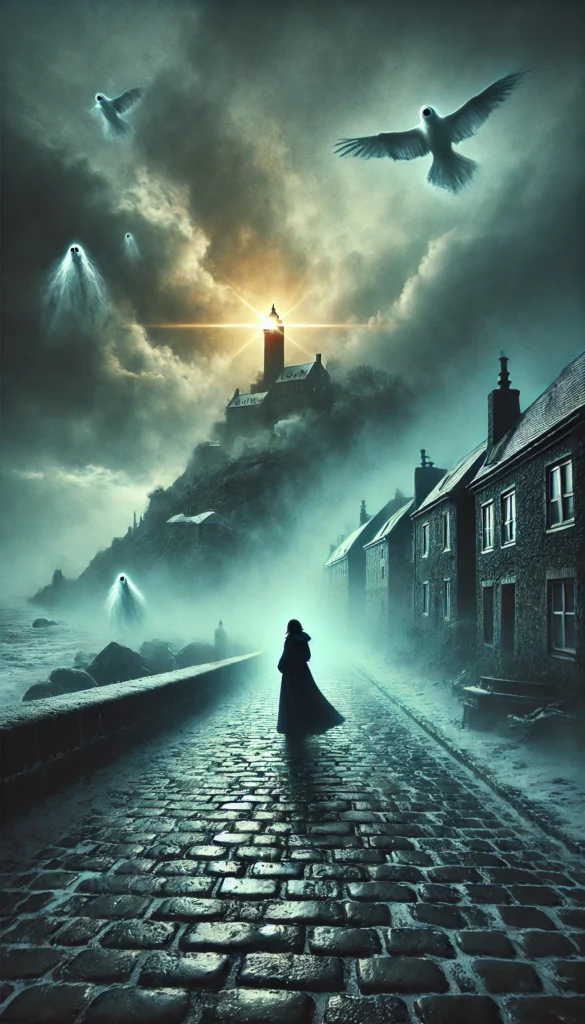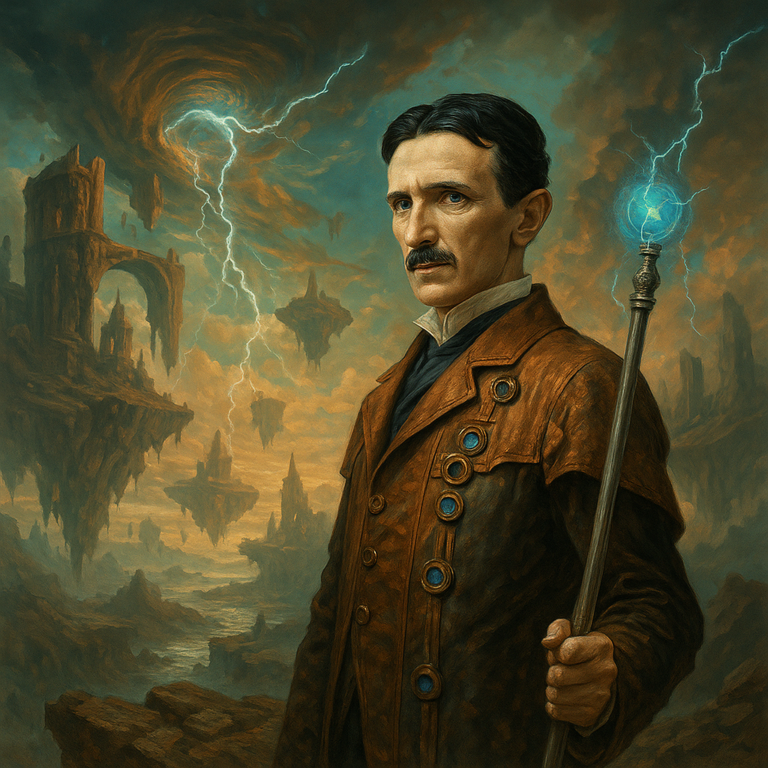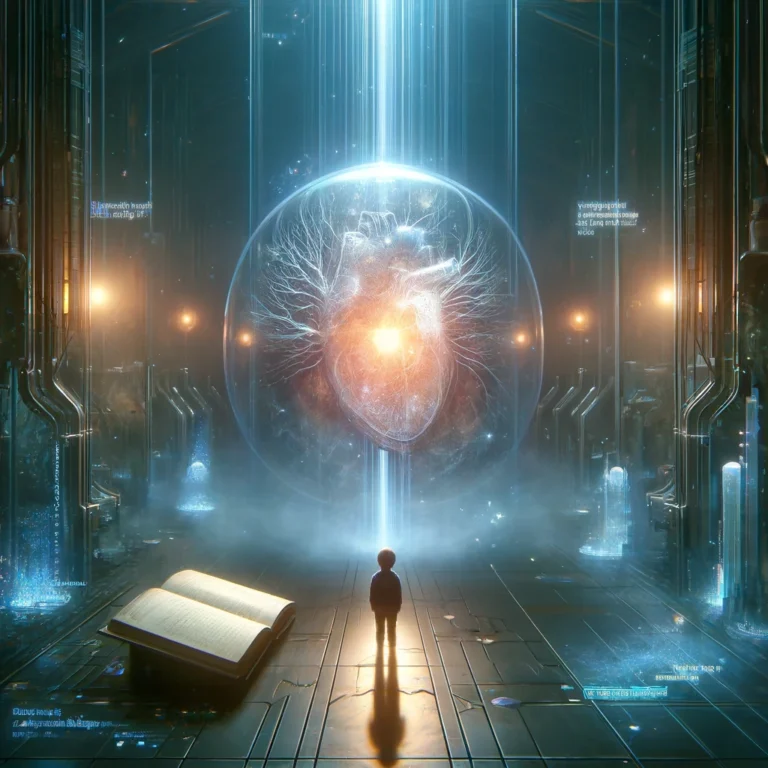Murmurs Under the Salt Fog
Chapter 1: Introduction
Puerto Bruma existed under a near-permanent baptism of salt fog. It wasn’t the clean, transient mist of cooler climes; this fog felt ancient, heavy, almost greasy, carrying the composite scent of brine, decaying kelp beds exposed at low tide, wet stone, woodsmoke from perpetually damp chimneys, and something else, something metallic and faintly unsettling, like old blood or deep-earth minerals. It moved with a slow, deliberate intent, rolling in from the formless grey expanse of the Atlantic, not merely covering the town but infiltrating it, seeping through the ill-fitting joints of the leaning, salt-scarred houses, pooling in the sunken cobblestone alleys, clinging to everything with a persistent, clammy embrace. Visibility often shrank to mere yards, turning familiar pathways into treacherous, echoing tunnels where the world ended abruptly in a wall of shifting white.

Sounds were casualties, distorted and untethered within the fog’s domain. The rhythmic tolling of the harbour buoy, meant as a steadfast warning, became a mournful dirge, sometimes seeming miles offshore, other times startlingly close. The cries of the few gulls brave or foolish enough to remain became strangled, disembodied shrieks. Footsteps on the slick stones might echo with unnerving clarity or be utterly swallowed, making approach or retreat a guessing game. And woven through this sonic chaos, the constant, undeniable presence of the murmurs – the countless, overlapping whispers of Puerto Bruma’s past, snagged like threads on the damp air.
Clara Montes stood near the desolate Plaza del Olvido, feeling the fog not just around her but in her, a damp weight in her lungs, a chill that settled deep in her marrow. Five weeks she’d been here, five weeks spent trying to convince herself the perpetual grey gloom was calming, that the isolation was healing. It wasn’t working. She’d fled the sharp, public glare of betrayal – shattered trust, whispered accusations, the ruin of her career – seeking anonymity, a place where no one knew her name or her story. Puerto Bruma, a forgotten smudge on a digital map, accessible only by a treacherous coastal road the locals called ‘El Espinazo del Diablo’ (The Devil’s Backbone), had seemed the perfect antithesis to her previous life. Quiet, remote, ignored. She hadn’t factored in the town’s peculiar brand of haunting.
Her eyes traced the faded lines of the mural on the pockmarked wall of what was once, according to a corroded plaque, the Harbormaster’s office. The galleon battling the monstrous wave seemed less like fantasy now, more like a grim allegory for life in this town – a constant struggle against an overwhelming, unpredictable element. She tried to focus on the visual details, the chipped paint, the way the salt had eaten into the plaster, anything to distract from the whispers eddying around her ankles like unseen currents.
They were louder today, undeniably so. Not just the usual background hum – the ghostly residue of market-day haggling (“…three silvers, not a copper more…”), fragments of prayers from the perpetually empty church (“…deliver us from the depths…”), the melancholic sigh of a long-dead accordion player. Today, individual voices surfaced with startling clarity, like actors stepping forward on a crowded stage. “…left the nets by the broken piling, fool…” – sharp, angry, distinctly male. “…always said blue was her colour…” – soft, mournful, female. “…the tide turns against us tonight…” – a low, prophetic rumble. It felt less like passive memory playback, more like the fog itself was… stirring, focusing.
She saw Tomas, the baker, emerge from his shop, wiping floury hands on his apron. He squinted into the fog, cocked his head as if listening intently for a moment, then shrugged and began methodically sweeping the already damp flagstones before his door. Acceptance. Or perhaps just profound weariness. Clara had tried asking him about the whispers once, during her first week, stammering a question about the strange sounds. Tomas had just blinked slowly, dusted a phantom crumb from his counter, and said, “Ah, la bruma. She talks. Mostly nonsense. Pay it no mind, señorita, unless she calls your name.” Then he’d turned away, signalling the end of the conversation. Unless she calls your name. The casual warning had chilled her then; it terrified her now.
She fumbled in her raincoat pocket for the small, sturdy notebook she carried everywhere, its pages a chaotic tapestry of overheard phrases, dates scribbled with question marks, crude sketches of the fog swirling in patterns that seemed almost deliberate. Documenting it felt like the only sane response, a scientist’s approach to madness. Had she imagined that voice? “…lockbox under the third floorboard…” The specificity was unnerving. Whose lockbox? Which house? The residue of the speaker’s panic felt grafted onto her own nerves. She’d considered seeing a doctor before leaving the city, attributing the growing anxiety, the heightened sensitivity to sound, to stress. Dr. Ramirez had offered tranquillizers and platitudes. He wouldn’t understand this. Could generations of isolation and perhaps inbreeding, she wondered morbidly, have made the inhabitants prone to auditory hallucinations, a collective delusion? Or was the delusion hers alone, a grief-induced psychosis settling in?
Further down the curving street, the warm, yellow light spilling from the windows of ‘Robles & Sons – Purveyors of Quality Goods Since 1887’ offered a stark contrast to the grey gloom. Inside, Mateo Robles stood behind a massive, dark-wood counter, reviewing a shipping manifest. The shop smelled of oiled wood, imported tobacco, coffee beans, and Mateo’s own faint, expensive cologne – an olfactory island of order and commerce in the sea of damp decay. He made a sharp, impatient notation on the manifest with a gold pen. He’d overheard a whisper earlier – something about “…engine trouble on the ‘Estrella’… might divert to Vigo…” The ‘Estrella del Mar’ was carrying a shipment of Portuguese ceramics he desperately needed to undercut a rival in the next town over. If it diverted, his advantage was lost.
He glanced up, his sharp eyes catching Clara lingering in the square. The newcomer. Still here. He’d made discreet inquiries. Clara Montes. Arrived suddenly, paid cash for six months’ rent on the old Pereda cottage up near the lighthouse. Keeps to herself. Jumpy. He’d seen her scribbling in that notebook. Listening. There was a rumour, whispered by old Marta who delivered the milk, that the girl had ‘la escucha’ – the listening sickness, an old term for those overly sensitive to the fog’s murmurs, often considered a sign of instability. Mateo didn’t believe in sickness; he believed in utility. If she truly was sensitive, perhaps her ‘affliction’ could be calibrated, focused. He needed better data, clearer signals from the fog, not just cryptic fragments about shipping or long-dead lovers. He envisioned… microphones? Resonating chambers based on old schematics he’d found tucked away in the town archives, dismissed as folklore? The potential was enormous. Secrets buried in the past, glimpses of the future – stock fluctuations, political shifts, personal scandals. The ultimate insider trading information, delivered by the very air. He tapped the gold signet ring on his little finger, the Robles family crest, feeling the familiar surge of ambition. This town, this fog, it was his birthright. And he would master it. Let the newcomer jump at shadows; he would harness the storm.
High above, clinging to the cliff face like a barnacle to a great whale, the Faro de Roca Perdida stood its ground. The rhythmic sweep of its beam was a familiar comfort to the ships that still dared Puerto Bruma’s treacherous harbour, but its true purpose, known only to a few, was far older. Inside the lamp room, the air thick with the smell of hot oil and polished brass, Vicente Roca moved with the quiet solemnity of a priest tending an altar. The massive, multifaceted Fresnel lens, a marvel of nineteenth-century engineering, gathered and focused the light into a piercing beam, and the intricate clockwork mechanism driving its rotation ticked with ponderous reliability.
Vicente leaned his forehead against the cool, thick glass, peering down into the swirling abyss where the town huddled. He could barely make out the glow from Robles’s shop, a pinpoint of defiant yellow. He saw a lone figure – the Montes girl, surely – finally moving away from the square, head down, shoulders hunched against more than the chill. His own unease resonated with hers. This fog felt… hungry. The murmurs weren’t just echoes; they carried jagged edges, sharp fragments of anger, fear, and desperate longing that scraped at the listener’s nerves.
He remembered the winter of ’78. The fog had been like this, thick and unnervingly articulate. It started subtly – whispers seeming to confirm suspicions, old grievances given fresh voice. Then came the ‘confusions’. Fishermen steering towards phantom lights. People hearing loved ones calling them from empty rooms. Old Man Hemetrio, found frozen by the sea wall, having apparently walked out of his house in his nightshirt, searching for his wife who’d been dead twenty years, convinced she was waiting for him on the waves. Vicente himself had heard things… whispers promising to reveal what had really happened to his younger brother, lost at sea years before. Tempting, poisonous whispers that preyed on grief and doubt. It had taken months, and a near-disastrous incident at the lighthouse itself – a sudden, inexplicable dimming of the lamp during a critical storm – before the fog had reluctantly retreated to its usual background grumbling.
He placed a hand on the central column housing the clockwork. The vibration felt subtly off, a discordant hum beneath the steady ticking. Was it just his imagination, coloured by memory? Or was the lighthouse, the town’s anchor against the fog’s chaotic influence, straining under the pressure? He performed his checks with meticulous care, adjusting a counterweight here, cleaning a lens surface there. Small, precise actions, a ritual against the formless dread coalescing outside. He knew Mateo Robles dismissed his diligence as the fussing of an old man. Robles saw the lighthouse as antiquated, inefficient. He didn’t understand its true function, its delicate, vital balance with the very phenomenon he sought to exploit. Vicente feared what might happen if Mateo’s ambition were to somehow interfere with that balance.
Clara quickened her pace, eager for the solitude of her rented cottage. The encounter with the specific whisper – lockbox, floorboard – had rattled her more than the usual ambient noise. It felt targeted, almost instructional, though the instruction was meaningless. She just needed to get inside, brew some strong tea, perhaps try the weak, unreliable internet connection to lose herself in the outside world for a while. Anything to silence the voices, both outside and in.
She was halfway up the winding path leading out of the main cluster of houses, the fog pressing close, turning the familiar shapes of stunted pines and gorse bushes into hunched, monstrous figures, when the second voice came.
It wasn’t like the others. It wasn’t an echo trapped in time. It didn’t carry the faded emotions of the long-dead. This voice was cold, sharp as broken glass, and utterly contemporary. It slid into her mind, bypassing her ears entirely, distinct and chillingly clear against the background murmur.
“He knows you’re here, Clara.”
Her blood didn’t just run cold; it felt like it solidified. She stopped dead, one foot hovering over a loose stone. The world seemed to tilt. He? The pronoun landed like a physical blow. There was only one ‘he’ she truly feared finding her. The man she had run from. The man whose betrayal had shattered her life. But he couldn’t know. Not here. This place was the end of the earth, deliberately chosen for its obscurity. It was impossible.
She spun around, heart hammering against her ribs like a trapped bird. Her eyes scanned the impenetrable white wall of the fog behind her, searching for any shape, any movement. Nothing. The path back towards the town square was empty, swallowed by the mist. The only sounds were the frantic thudding of her own pulse and the distant, mournful sigh of the buoy.
The voice hadn’t sounded like him. It was… different. Sexless. Flat. Utterly devoid of emotion, which somehow made it even more terrifying.
He knows you’re here, Clara.
It wasn’t just a statement. It felt like a judgment. A pronouncement.
The carefully constructed anonymity of Puerto Bruma, her shield against the past, evaporated in that single, terrifying moment. The isolation she had sought had reversed polarity, transforming from sanctuary into a trap. Someone knew her name. Someone knew she was hiding here.
And the fog, the sentient, whispering fog that permeated every stone and soul in this cursed town, had become the messenger.
Chapter 2: The Splintering Veil
Clara didn’t sleep that night.
The voice—that cold, impossible phrase that had pierced the fog like a blade—kept echoing inside her, like a tremor trapped in her bones. “He knows you’re here, Clara.” She had heard it not with her ears, but within her mind, as if the message had slipped directly beneath her skin, bypassing her senses, embedding itself like a parasite.
She left every light on. The yellowed bulbs flickered above the kitchen table, illuminating the mess of half-drunk mugs, unfinished drawings, and her notebook—open, pages filled with the same phrase scrawled over and over until the words lost all meaning. Just ink. Just fear.
Past midnight, driven by a desperate instinct, she opened the cabin door. The fog crept in instantly, like a curious animal. She held out her phone and recorded the silence. Static. A faint hum. Nothing more. She played the recording again and again, hoping, fearing. All she heard was her own breathing. The fog seemed to mock her.
Meanwhile, atop the cliff, Vicente Roca, the lighthouse keeper, unlocked a hidden compartment behind an old cabinet in the lamp room. Inside, wrapped in time-stained cloth, were letters—dry, somehow untouched by the ever-present damp. He recognized the handwriting instantly: his brother’s. The words spoke of dreams riddled with voices, of seeing himself from afar, standing in places he’d never been. The final lines read: “The storm isn’t from the sea, Vicente. It’s in the fog. It’s in the very air. Something is coming.”
He had dismissed the letter for years—madness, grief. But now, that same dissonance buzzed through the tower again. The fog was speaking.
In the village, Mateo Robles hadn’t slept either. The back room of his store had transformed into a chaotic laboratory, cluttered with cables, nautical radios, gramophone horns, mica shards, and salvaged transmitters. The device he’d constructed—a patchwork of makeshift engineering and folklore—he called the Resonance Box.
He powered it up near dawn. A soft electric hum filled the room, and a pale blue light glowed from the device’s core. At first, nothing. Then, a whisper. And another. Then, a voice—clear and unnatural.
“She walks the edge of knowing. The veil will tear.”
Mateo leaned in, breath caught.
“What veil?” he asked.
Silence. Then, another voice—lower, raspier.
“You are the tear.”
Mateo smiled.
At sunrise, Clara drifted into the village square like a sleepwalker. Tomas the baker handed her a loaf of bread in silence. His eyes avoided hers. Farther down, Marta rocked on her porch, murmuring: “Not again… not again… too soon…”
The air felt heavy with unspoken dread. Everyone knew something. No one would speak of it.
Clara returned to her cottage. She knelt near the hearth and pulled up the third floorboard. Beneath it: a rusted tin box. Inside: a brass locket and a yellowed newspaper clipping. “Tragedy at Faro de Roca Perdida – Young Keeper Lost at Sea.”
The face in the photo was faded, but unmistakably resembled Vicente.
The locket clicked open, revealing a miniature painted portrait of a woman and a curled lock of hair. Clara’s chest tightened. She didn’t know why, but the object felt like a key. An anchor.
And when she touched it, the fog outside began to sing.
That afternoon, the fog was thicker than ever before. The village vanished behind her as Clara climbed the winding path to the cliff. The branches leaned toward her. The lighthouse’s beam sliced the mist like a blade.
The lighthouse door stood ajar.
Vicente was at the lens, hands clasped behind his back, eyes lost in the white.
“You’ve heard them,” he said without turning.
Clara nodded. “They showed me something. Your brother.”
He closed his eyes.
“Then it’s real. The cycle has restarted. Just like in ’78.”
“What happened then?”
“People disappeared. Walked into the sea. Families fell apart from whispered truths. Some went mad. Others just… surrendered. I barely kept the light steady. But we held it off. Barely.”
“What changed?”
He gestured toward the lens.
“This. It was recalibrated secretly to emit more than light—a resonance. A barrier. But now, something’s changed. The pressure’s rising. The fog wants in.”
Clara showed him the locket. His face turned ashen.
“She was his fiancée. Never knew what happened to him.”
“Why was it under my floor?”
Vicente turned toward the sea. The fog pulsed.
“Because you were meant to find it. You’re part of this now.”
That same night, Mateo adjusted the Resonance Box again. This time, the voice was different—sharp, childlike.
“The gate is opening.”
“Who are you?” he asked.
“We are echoes. What remains after.”
Then silence.
The next day, the sun never rose. The sky remained grey, flat, as though the world had been switched off. Clara stayed at the lighthouse. She helped Vicente clean and recalibrate the delicate mechanisms. She noticed how the fog recoiled each time the beam swept across it—shivering, pulling back like a shadow under scrutiny.
“The fog is alive,” Vicente said. “It’s a threshold. An interface. Between us… and them.”
“Them?”
He met her gaze. “Not ghosts. Not quite. Conscious memories. Impressions with intent. Not dead, not living. Suspended. And when the veil weakens… they bleed through.”
“Why now?”
He didn’t answer. But both of them were thinking the same name: Mateo.
That night, Clara returned to the square. Mateo was outside his shop, smoking beneath the overhang.
“You hear them too,” she said.
He didn’t deny it. “I can measure them. Record them. Understand them. Work with me. We can decode this. Use it.”
“You think it can be controlled?”
He smiled. “Everything can be.”
She left him standing there, unsure whether she pitied him… or feared him.
Later, back at the lighthouse, the whispers began again. But this time, it was different.
A single word. A name, over and over.
“Vicente…”
Vicente’s eyes widened.
“It wants me now.”
Clara gripped the locket.
“Then we have to give it something else.”
Outside, the fog pulsed like a living heart.
Chapter 3: The Light That Remains
The fog pressed against the glass walls of the lighthouse like a living creature desperate to be let in. It pulsed in time with Clara’s heartbeat. She could no longer tell if the sensation was physical or psychological, if the haze was knocking or whispering or simply watching. It didn’t matter. It had intent.
Vicente stood at the control panel, making minute adjustments to the mechanism beneath the Fresnel lens. Each tick of the gears, each rhythmic swing of the light, felt like the heartbeat of a giant organism slowly losing its rhythm.
“They’re converging,” he said softly, almost reverently. “The boundary is collapsing.”
Clara stood by the window, gripping the locket in her fist. The fog outside no longer seemed passive. It moved in unnatural currents, swirling in spirals and eddies that defied the wind. She’d seen one of them take shape for a moment—just a second—a woman’s silhouette with streaming hair and an open mouth frozen in a scream. It had blinked away like static, leaving a trail of nausea in its wake.
“We have to stabilize the lens,” Vicente continued. “There’s a harmonic imbalance. Something’s disrupting the frequency.”
“Mateo,” Clara said. “He’s interfering. He thinks he’s tuning the fog, but he’s… provoking it.”
Vicente didn’t argue. He simply nodded, fingers tightening on a small lever, adjusting the pitch of the rotation mechanism.
“You said the light is a barrier,” Clara said. “Can it still hold?”
“Maybe. If we can reinforce the pulse. But it needs a source.”
“What kind?”
Vicente hesitated, his gaze lingering on the locket in her hand.
“Memory,” he said. “Emotion. Anchors. The fog feeds on resonance—it responds to pain, love, longing. That’s what gives it shape. The light… it counters that with clarity. But it needs something to focus through.”
Clara looked at the relic. The painted face. The curl of hair. She understood.
“I’ll do it,” she said.
Before Vicente could respond, the fog outside parted.
And a figure stood at the edge of the cliff.
Mateo Robles was bathed in pale blue light from the portable resonance unit he had slung across his back. Thin copper wires trailed from it like veins. His eyes were glassy, fixed on the lighthouse with an unreadable expression.
Clara and Vicente stepped out cautiously. The fog rolled around them, whispering, shifting. But it did not touch them directly. Not yet.
“Mateo,” Clara called. “You need to stop. You don’t understand what you’re opening.”
“Oh, I understand perfectly,” Mateo said. His voice was calm, almost gentle. “They’ve shown me things. Not just the past. Not just the dead. Futures. Potentials. All the paths we might take. I’ve seen Puerto Bruma reborn—thriving, feared, respected. We control the veil, Clara. We don’t hide from it.”
“It’s not a door,” Vicente said grimly. “It’s a tide. You don’t open the sea and expect to stay dry.”
Mateo tilted his head.
“You’re still clinging to old myths. But this—” he tapped the device on his chest, “—this is science. This is control.”
The fog around him shimmered. Shapes emerged—fragmentary, human-like, flickering in and out of visibility. A child laughing and then crying. A man screaming. A faceless woman reaching out.
“They’re not what you think,” Clara whispered. “They’re not tools. They’re… remnants. Echoes of things too broken to be whole.”
“They’re data,” Mateo said. “Memories are just information, Clara. And I’ve learned to read them.”
Then, with a sudden jolt, the fog surged.
Clara was thrown backward, Vicente pulled her to cover as tendrils of mist snaked across the ground like searching fingers.
The lighthouse beam wavered.
Then—darkness.
Inside the tower, chaos.
The mechanism had stalled. The lens stuttered, its rhythmic pulse shattered. Without the light’s steady sweep, the fog poured in like smoke under a sealed door.
Clara screamed as cold filled the chamber, not the cold of weather, but of absence—of being unmoored from time and place. She heard voices, thousands of them, layers upon layers of sound pressed together. A mother calling a child. A soldier whispering a name. A lover begging forgiveness.
She clutched the locket to her chest and ran.
“Vicente!” she shouted. But he was already at the controls, wrenching a backup crank into place.
“Hold the lens steady!” he barked.
“I can’t—there’s too much interference!”
“Then give it something to fix on!”
She remembered his words. Anchors. Memory.
She stepped in front of the lens.
The beam ignited again, and for a moment she felt everything.
Her mother’s face when she was six, brushing hair from her eyes. The smell of rain on asphalt after her first heartbreak. The touch of someone she’d trusted, then feared. The sound of her own name, spoken with kindness.
She poured it all into the light.
And the fog screamed.
Outside, Mateo convulsed. The resonance box crackled, overloaded by signal. The apparitions around him twisted, flickered, turned on him.
“No!” he shouted. “You’re mine! I summoned you!”
But they weren’t listening anymore.
They moved toward him, dozens now—hundreds. Some looked familiar. Others had no faces at all. They didn’t walk. They floated. They poured through the fog like blood through water.
He turned to run.
The fog swallowed him.
Clara collapsed.
The light had stopped pulsing, now a constant beam searing through the veil. The fog hissed at its touch, recoiling, thinning. The voices had receded to a whisper, softer now, mournful.
Vicente helped her up.
“You held it,” he said. “You gave it shape.”
“I gave it… everything,” she whispered.
They looked toward the edge of the cliff. No sign of Mateo. No trace of the device.
Just silence.
Days passed.
The fog remained, but lighter. Quieter. It no longer pressed against the walls with hunger. The town began to breathe again.
In the lighthouse, Clara sat by the lens, the locket resting on the windowsill. She still heard whispers, sometimes. But now they seemed… grateful.
Vicente stood beside her, a hand on her shoulder.
“You stabilized it,” he said. “For now.”
“What about next time?” she asked.
He smiled sadly. “Next time, someone else will listen.”
She turned to him.
“Do you think they were ever alive? The ones in the fog?”
“I think… they were stories. Left unfinished. And we’re just the ones who hear them.”
Clara watched the horizon. The fog curled gently along the water’s edge.
“I think I’ll stay,” she said. “There’s more to understand. And someone has to keep the light.”
Vicente nodded.
“I was hoping you’d say that.”
And far below, in the salt-worn streets of Puerto Bruma, the whispering fog began to hum again—not with menace, but with memory.






